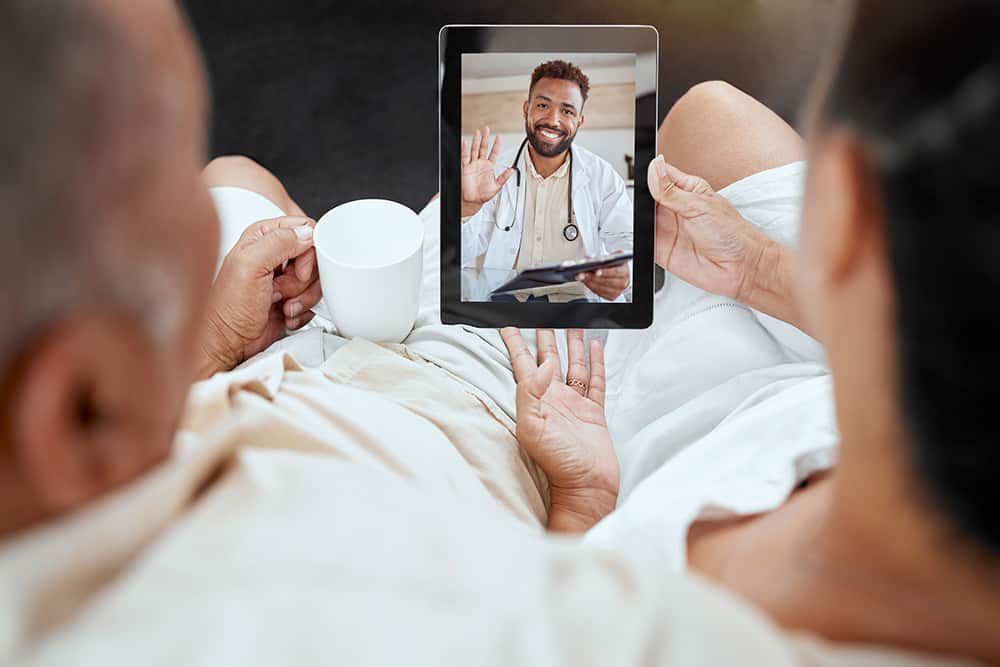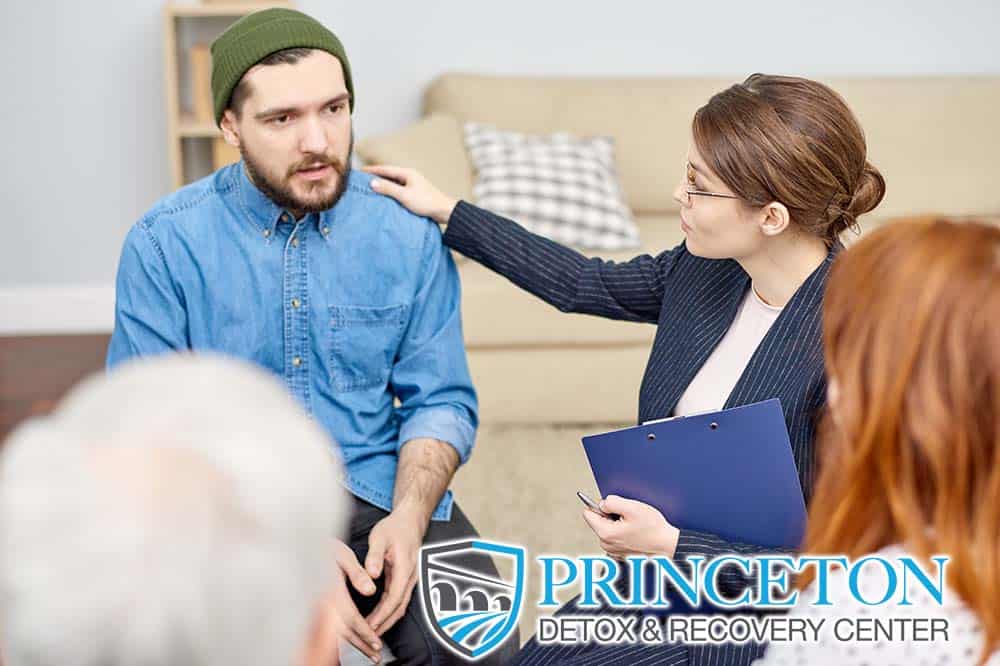Virtual and telehealth options (also known as telemedicine or tele-therapy) allow clients to meet with healthcare professionals remotely in real-time without being present in the same location. Services are provided through video conferencing technology and include therapeutic meetings focused on physical, mental, and addiction-related health issues. During a telehealth session, clients can interact with the healthcare provider through phone, video chat, or messaging platforms. Here, providers can assess symptoms, diagnose conditions, and prescribe medications or treatment plans.
Princeton Detox offers a wide variety of clinically proven treatments for addiction, including inpatient detox, individualized therapy, family therapy, medication-assisted treatment, and more. Addiction can be a very difficult disease to manage, and recovery is a long-term journey that often requires therapy, emotional support, and, most importantly, motivation. Contact us today to learn more about our dedication to helping individuals triumph over addiction and cultivate lifelong sobriety and well-being.
The Rise & Benefits of Telehealth in Addiction Treatment
Telehealth has been rapidly rising in popularity as a method of delivering addiction treatment services. During the COVID-19 pandemic, this form of healthcare became a necessity to allow clients access to some types of treatment, and remains popular to this day. According to data from the U.S. Census Bureau, 22% of Americans used telehealth services during the past month, as of the beginning of 2022. (1)
The high incidence of telehealth use represents a trend that originated during the pandemic. For example, according to research in the May 2022 edition of Psychiatric Services, more than one-quarter (27%) of specialty addiction treatment centers offered telehealth as an option before the pandemic. (2) The popularity of telehealth has only increased, and Americans continue to view this virtual healthcare as highly beneficial.
Benefits of Virtual Addiction Treatment
Virtual addiction treatment offers several benefits that can make it an effective and accessible option for individuals seeking addiction treatment, including increased accessibility, affordability, privacy, and flexibility.
Accessibility & Convenience
Telehealth addiction treatment allows individuals to access treatment from anywhere with an internet connection, making it more attainable for individuals who live in rural areas or have mobility or transportation issues. Through virtual sessions, individuals can participate in therapy and support groups from the comfort of their own homes, which can be more convenient and less stressful than face-to-face treatment.
Affordability
Virtual addiction treatment may be more cost-effective than in-person treatment, as it eliminates the need for travel or other expenses related to leaving the home, such as childcare. It can also be more efficient, allowing providers to visit more clients in less time. This can result in cost savings for both providers and clients. Furthermore, some insurance plans may cover virtual healthcare treatment at a lower cost than in-person treatment, with these benefits resulting in savings for clients with insurance.
Privacy & Flexibility
Some clients may feel more at ease discussing sensitive topics in a virtual environment than in person, which can increase the privacy and confidentiality of treatment. Telehealth options also often offer increased flexibility in scheduling appointments, which can be beneficial for those with active schedules or work or family responsibilities.
Challenges & Limitations of Virtual Addiction Treatment
It is important to note that not all healthcare services are appropriate for virtual and telehealth sessions, and in many situations, an in-person visit may be required. Some of these may be related to technological factors or the client’s needs.
Technological Factors
Virtual addiction treatment relies heavily on technology, which can be a challenge for some individuals who lack access to the necessary devices or internet connectivity. Technical issues such as poor video or audio quality can also disrupt the treatment process and hinder communication between the client and therapist. Despite these challenges, virtual addiction treatment can still be a valuable tool in the recovery process, particularly for those who may not have access to in-person treatment or who prefer the convenience and flexibility of virtual care.
Client Needs
Addiction treatment often involves medical interventions, such as detox or medication management. In many cases, virtual treatment does not allow for these approaches, which can limit its effectiveness. Also, it will not provide access to intensive programs, such as residential treatment.
Clients who try to establish trust and a personal connection with their therapists may find doing so more challenging in a virtual setting that does not have the benefit of in-person communication. Furthermore, although group therapy can be an effective tool in addiction treatment, it may be less effective in a virtual environment. Participants may find it challenging to engage with one another or share personal experiences when not in person.
Efficacy of Telehealth & Virtual Addiction Treatment
Telehealth and virtual addiction treatment have been shown to be effective for many individuals struggling with addiction. Studies have found that virtual treatment can be as effective as in-person treatment in some cases. For example, in a May 2022 article in Psychiatric Services, the authors examined published studies that compared addiction treatment via telehealth with in-person treatment. (3) Seven studies found telehealth treatment was effective but not more effective than in-person treatment regarding retention, therapeutic relationships, and substance use.
In another study from 2020 in the Journal of Medical Research, telemedicine was found to be an effective tool in decreasing alcohol use and increasing clients’ accessibility to health care providers and services. (4)
Virtual Recovery Support Groups as Alternatives to In-Person 12-Step Meetings
Virtual addiction support groups are online communities that provide a supportive environment for those struggling with substance use. These groups can be accessed through Internet platforms such as messaging apps, online chat rooms, and video conferencing. They can take on many forms, including 12-step programs like Alcoholics Anonymous (AA), SMART Recovery, and others. (5)(6)
Groups such as these aim to provide a safe and supportive space for individuals to connect with others and share their common experiences and challenges. They can be particularly beneficial for those without regular access to in-person support groups, such as those who have travel limitations.
Online Support Tools for Addiction Treatment
In addition to telehealth visits and support groups, there are other tools for those in recovery offered in a virtual environment. For example, there are several mobile apps available that provide support and resources for individuals in recovery, including Sober Grid and the AA Big Book. (7)(8) There are also several online websites available that provide information on addiction recovery, including SAMHSA. (9) Finally, some addiction treatment programs are available online and can deliver a complete continuum of treatment remotely.
Legal & Regulatory Considerations of Telehealth in Addiction Treatment
Providers of virtual healthcare must act in accordance with state and federal laws regarding client privacy protection, licensing, confidentiality, and security.
Licensing
Healthcare professionals providing telehealth services must be licensed in the state where the client is located. In some instances, providers may need to obtain additional licensing or certifications to provide these services outside the state.
Confidentiality
Client information must be protected and kept private in compliance with the Health Insurance Portability and Accountability Act (HIPAA). This includes ensuring that telehealth sessions take place in a secure environment and that client information is transmitted securely.
Security
Telehealth security requirements are critical to guaranteeing the confidentiality of client health information.
Telehealth Security Measures May Include:
- Encryption—Data transmitted between healthcare providers and clients during telehealth sessions must be encrypted (encoded) to prevent unauthorized access or interception.
- Secure Platform—Telehealth platforms are required to adhere to industry-standard security protocols, such as HTTPS and SSL.
- Access Control—Access controls must be implemented to ensure that only authorized individuals can access client health information, including the use of strong passwords and two-factor authentication.
- Data Storage—Client health information is required to be stored securely in compliance with HIPAA regulations. This includes access controls, regular backups, and disaster recovery plans to protect client data.
- Risk Assessments—The organization offering virtual services must conduct assessments to identify and assess weaknesses and potential threats to its data and determine how to minimize those risks.
Training—Regular education and training must be provided to staff on telehealth security best practices, including how to identify and respond to possible security threats.
Contact Princeton Detox Today To Learn More About Virtual Telehealth Options
Many clinical services can be performed virtually and provide clients with a variety of therapy, counseling, and group support options. However, medical detox is almost always the first step in addiction treatment, as it requires individuals to undergo around-the-clock supervision while they safely and comfortably withdraw from toxic substances. They are also provided with appropriate medication that can help mitigate unpleasant and possibly severe symptoms, so they can focus on starting the early stages of recovery.
Reach out to Princeton Detox today for a free, no-obligation assessment and health insurance benefits check. You can speak to a skilled Treatment Advisor who can explain more about our streamlined admissions process and therapeutic programs and services. We are committed to helping individuals struggling with addiction nurture happier, healthier lives.

Reviewed for accuracy by:
Amanda Hilzer M.Ed, CAADC, IADAC, ICCS, LCADC, CCS
Amanda graduated from Lehigh University with both an undergraduate degree in Psychology and a Master’s of Education degree in Counseling Psychology and has worked in the field of substance use disorder treatment and mental health treatment as a counselor and as a clinical manager for over 14 years.

































